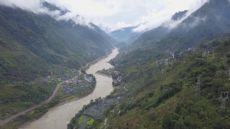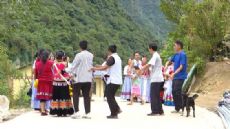| |
 Transport improvements help mountain village in Yunnan to reduce poverty Transport improvements help mountain village in Yunnan to reduce poverty
|
 |
10/24/2020

 
People in Majimi Village of Nujiang Lisu Autonomous Prefecture, which lies in the depth of the Nujiang Canyon, had to travel by ziplines for generations. But thanks to the local authorities' poverty relief work, the village has bid farewell to them.
Instead, they are now using them to transport agricultural products down mountains, which has greatly helped increase their income.
Majimi Village sits between the steep Gaoligong Mountains and the Biluo Snow Mountains. The Nujiang River rushes past the village. Pu Youbo, a villager living in Majimi, never forgets that his mother and he nearly drowned in the river.
The accident happened when his mother took the then seven-year-old across the Nujiang River to school. However, the water level of the river had risen dramatically. To make matters worse, the only transportation tool they had was the zipline.
"Water reached this part of my mother's body. Still, she held me closely with her legs while climbing up hard," said Pu.
Until 2011, there were still 42 ziplines on the Nujiang River, the Dulong River and the Lancang River in Yunnan.
To change the transportation mode, local government started building bridges to replace the ziplines.
Since the end of 2018, the first bridge in Majimi was put into use, which completely ended the village's history of crossing rivers by ziplines.
"This bridge is also the dream of generations of residents in our village. After the bridge was built, even our oldest villager, who is already 90 years old, would walk around on the bridge and sometimes take his family members to have a walk there," said Pu.
With the new bridge, children in the village no longer have to rely on ziplines to go to school.
In the meantime, the cost of transporting construction materials into the village has been greatly reduced. In addition, agricultural products have a greater price advantage after being transported out of the village. Since the bridge was finished, the village has eliminated its development bottleneck in the past.
Nowadays, villagers plant tsaoko fruits, which are five to seven times more expensive than corn, and built more than 20 ziplines to transport the fruits down from the mountains.
"It takes more than 20 minutes for me to get down from the point above without carrying anything, but during the same time this zipline can transport tsaoko fruits down seven times or eight times. In total, it can transport down 800 kilograms of the fruits," said Deng Fuzao, a local resident.
The construction cost of a 1,000-meter-long zipline is more than 10,000 yuan (around 1,500 U.S. dollars), but after it is completed, it can save villagers 20,000 to 30,000 yuan in labor costs.
"Our village has a relatively large area of tsaoko fruits. We have some 733 hectares of them. So if tsaoko fruit transportation ziplines are built, more residents can be benefited," said He Xiaofan, head of the Poverty Alleviation Taskforce responsible for the village.
Ziplines in the past and present have witnessed the transformation of Majimi Village. Additionally, the village is expected to be completely out of poverty by the end of this year with various governmental polices including transportation and industrial development support, relocation, and renovation of dilapidated houses.
|

|
 |
|

|